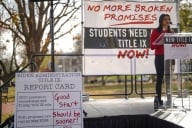You have /5 articles left.
Sign up for a free account or log in.
A student suspended from Indiana Wesleyan University for sexual misconduct is suing the Christian liberal arts institution for allegedly acting with bias in suspending him and, in an unprecedented claim, for also failing to inform him that he may have been exposed to HIV.
The student, identified as John Doe in the complaint he filed against the university in January, was found responsible and suspended in December for sexually assaulting a female student the month before. His one-year suspension occurred as part of the university’s sexual misconduct process under Title IX, the law prohibiting discrimination based on sex at federally funded institutions. Doe's complaint says that process was “inherently biased against him and predetermined his guilt from the start,” which is a common complaint of students who bring lawsuits in federal court to dispute the intent and results of their institutions’ misconduct procedures.
While going through the process of gathering evidence from the university in March, Doe was in “complete shock” to learn of a report stating that the female student who accused him of sexual assault told her professor during the fall 2019 semester that she tested positive for HIV, said Susan Stone, Doe’s attorney and co-chair of the Student & Athlete Defense and Title IX Practice Group for Kohrman Jackson & Krantz, an Ohio-based law firm. Anneke Stasson, the professor, filed an incident report form to the university about the HIV claim on Dec. 11, but Doe, who was suspended by a student life official the following day, was not told about it, Stone said.
HIV, or the human immunodeficiency virus, is the virus that causes AIDS.
“It was quite possibly the worst call that we have ever as attorneys had to make to a client, and we practice criminal defense,” Stone said.
The finding was even more concerning given that it was discovered amid the coronavirus pandemic; Doe has asthma and a seizure disorder, which make him more susceptible to COVID-19, Stone said. But because of concern about the possibility of having HIV, Doe left his California home, where he was sheltering in place with his family, on April 6 to be tested for HIV. The test results were negative, she said. As a result, Doe asked the court to add defamation and “negligent infliction of emotional distress” claims to his lawsuit and to include two administrators and the female student as additional defendants, according to documents filed last week in the U.S. District Court for the Northern District of Indiana.
Indiana Wesleyan has until April 22 to file a response to the additional claims, a spokesperson for Kohrman Jackson & Krantz said in an email.
Jerry Shepherd, the university's vice president for communication, declined to comment on the status of a response to the complaint.
“Indiana Wesleyan University is committed to creating the safest campus community possible for our students,” Shepherd said in an email. “We closely follow federal regulations for the investigation of sexual assault and have personnel who have been thoroughly trained in process and procedure.”
Title IX lawsuits and defamation allegations tend to “go hand in hand,” and most are related to communications by university officials that label students who denied engaging in sexual misconduct as sexual predators, said Jake Sapp, a researcher for the Stetson University Center for Excellence in Higher Education Law and Policy. Statements made by parties and witnesses to investigators and officials working on a specific Title IX report “within the scope of their job” are generally safe from defamation claims, while statements made outside the process are a risk, depending on who said it and where it is republished, Sapp said.
Sapp said the defamation claim attached to the complaint against Indiana Wesleyan was “nothing surprising,” but the content of the claim -- that the male student was accused of having and spreading a life-threatening virus -- is something he hasn’t seen before. Under current Title IX law, the university would not necessarily be required to notify the student of this additional allegation made after the initial report of alleged sexual assault, unless this is included in their policy, Sapp said. Indiana Wesleyan’s zero-tolerance policy for sexual assault and other crimes does not outline any such notification process.
Doe's lawsuit claims that his accuser made the allegation about HIV to Stasson to “further damage John’s reputation among the IWU officials who were deciding his case.” Stasson’s report to the university about the HIV claim suggests the professor had “already written our client off as a sexual predator who has HIV” before the Title IX investigation into alleged sexual assault had concluded, said Kristina Supler, an attorney for Doe who co-chairs the Kohrman Jackson & Krantz practice group with Stone.
“I asked how she was doing and if the guy had been sent off campus yet,” Stasson wrote in the form. “‘No,’ she said, ‘he is still here.’ I was shocked. She then told me that she had been tested for STDs and she tested positive for HIV. It makes me really worried to think that the guy who gave her HIV is still on this campus.”
The female student called Stasson’s report a “miscommunication.” She said she never told the professor she tested positive for HIV, but that Stasson did suggest the student get tested for sexually transmitted diseases after the reported assault, which she said she did in December following the conclusion of the Title IX investigation. The female student, who communicated by text and on the condition of anonymity, said she only found out about Stasson’s report in March. She said if she had known about it sooner, she would’ve corrected the information in the report.
Stasson declined to comment further on the report she filed to the university. "I don't have anything else to say," she wrote in an email on April 16.
The female student said even if the HIV claim was a miscommunication between her and Stasson, the university should have told Doe about it.
“I have no respect for him whatsoever but the decency would be to inform him regardless,” she said.
Peter Lake, director of the Stetson center for higher education law, said confidential student information maintained by a university is generally protected by the Family Education Rights and Privacy Act. But the law includes an exception for universities to disclose information to “appropriate parties … if knowledge of that information is necessary to protect the health or safety of the student or other individuals.”
The female student said the Title IX process over all at Indiana Wesleyan was “thorough and fair.” She said Andrew Parker, associate vice president and dean of students, investigated her complaint and met separately with her and her alleged assaulter several times. Her case is now being investigated by the City of Marion Police Department, in the same city where the university is located, she said.
In the lawsuit, Doe takes issue with Indiana Wesleyan’s Title IX process, which uses a single investigator model, with one official responsible for investigating, concluding and issuing sanctions for violations of the student conduct policy. A number of public institutions have moved away from this model because some courts have “shown skepticism” toward models where there is no live questioning directly between parties and their representatives, said Samantha Harris, vice president for procedural advocacy for the Foundation for Individual Rights in Education, or FIRE.
The U.S. Court of Appeals for the Sixth Circuit has held that public institutions have to provide cross-examination of witnesses, rather than interviewing parties and witnesses separately, Harris said. In a notable 2016 decision in Massachusetts district court, a federal judge was one of the first to criticize the single investigator model, saying it has “obvious” dangers. Under the new Title IX regulations proposed by Secretary of Education Betsy DeVos, institutions would not be permitted to use the model, Harris said.
“It poses a lot of concerns because you’re vesting all of these different powers in one person,” Harris said. “Even if the person is well intentioned, it opens up the idea that this one person’s biases and views are going to swing the outcome one way.”
But until the Department of Education's regulations are finalized, institutions are not broadly required to offer cross-examination or a live hearing process for students who report or are accused of sexual misconduct, Harris said.
Lake, of the higher ed law center, said it’s “too strong a position” to say the investigator and decision maker in a campus Title IX process always have to be separate.
“A lot of private schools are holding the line with the single investigator model that they’ve created,” he said. “It’s a little bit situational, regional and local. There’s a definite trend with a certain number of private schools that take the position that they’ll move when they have to.”
Doe’s claim about Indiana Wesleyan’s “procedural deficiencies” is ineffective because the university’s student handbook does not guarantee a process with multiple decision makers, a live hearing structure or legal representation, Amanda Shelby, a partner at Faegre Drinker Biddle & Reath LLP, the law firm representing the university, wrote in a brief responding to the original lawsuit.
A 2018-19 copy of the handbook published on Indiana Wesleyan’s website describes a student conduct process where a university official will make a student aware of a report against them, meet with them to present information and ask questions about the report, give the student a chance to present evidence, then further investigate or make a decision about sanctions during that meeting.
“Plaintiff may not have liked IWU’s procedures for investigating and resolving reports of sexual assault, but his personal disagreement and dissatisfaction with those procedures has nothing to do with his gender and do not give him a right to relief under Title IX,” Shelby wrote.








